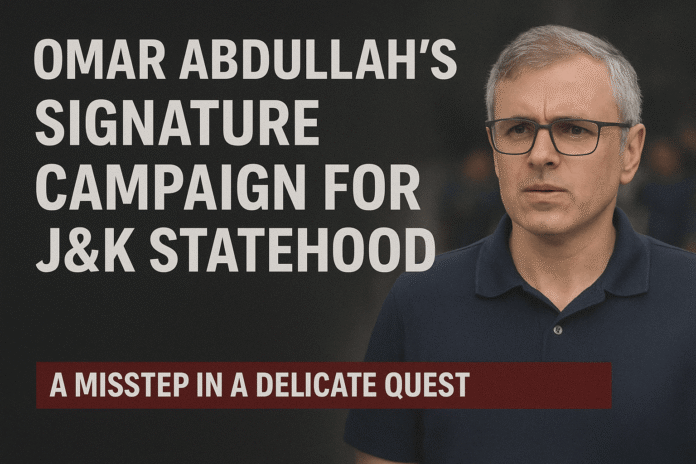Omar Abdullah’s Signature Campaign for J&K Statehood: A Misstep in a Delicate Quest
Editorial by The Public Tv
On August 15, 2025, Chief Minister Omar Abdullah launched a door-to-door signature campaign to demand the restoration of full statehood for Jammu and Kashmir (J&K), announced during his Independence Day speech in Srinagar. Now underway across the region’s 90 assembly segments, starting in Mendhar, Poonch, under Minister Javed Ahmed Rana, the campaign seeks to gather public support to petition the Centre, Supreme Court, and President. While the aspiration for statehood resonates deeply in a region stripped of its special status in 2019, the campaign has drawn reasoned criticism for its legal limitations and questionable strategic value. As J&K navigates its complex political reality underscored by a recent bill introduced on August 20, 2025, to amend the J&K Reorganisation Act for unrelated governance changes—this initiative risks being seen as symbolic rather than substantive. A more constitutionally grounded approach could better serve the region’s aspirations.
The Context: A Region in Transition
The campaign emerges from a pivotal moment. The 2019 abrogation of Article 370 transformed J&K into a Union Territory (UT) under the J&K Reorganisation Act, reducing its autonomy and placing key functions like law and orderуже under the Lieutenant Governor (LG). In December 2023, the Supreme Court upheld this change but urged the Centre to restore statehood “as soon as possible,” mandating elections by September 2024. Those elections delivered a strong mandate to Abdullah’s National Conference (NC), securing 42 seats alongside Congress’s six, forming a 50-MLA government. Yet, the LG’s overriding powers continue to limit the elected government’s authority, fueling calls for statehood.
The signature drive, Abdullah argues, reflects the people’s will. Responding to critics on August 19, he said, “Opposition will oppose that’s their role,” framing the campaign as a democratic expression. However, voices across the spectrum opposition parties like the PDP and PC, and even community figures like cleric Aga Syed Mohammad Hadi have raised concerns about its efficacy and intent.
Logical Concerns: Symbolism Over Strategy
The campaign’s strategic value is questionable. With a robust assembly majority, the NC could leverage formal channels to advocate for statehood, yet it has chosen a grassroots petition. Critics like PDP’s Waheed Para argue this sidesteps the NC’s election promises, such as addressing the loss of Article 370, which Abdullah campaigned on but now acknowledges as challenging under the current regime. PC’s Sajad Lone calls it a “cosmetic exercise,” suggesting it shifts focus from substantive governance to public relations. In a region grappling with economic strain and security concerns, mobilizing citizens for signatures may divert energy from pressing issues like unemployment or development, potentially eroding public trust in the NC’s ability to deliver on its mandate.
The campaign also risks deepening J&K’s political divides. Post-2019, public confidence in institutions is fragile. A move perceived as symbolic could alienate voters expecting decisive action, especially when the NC’s strong electoral position offers leverage for more direct advocacy.
Legal Realities: A Petition Without Power
Legally, the campaign lacks weight. Signature petitions carry no constitutional authority to compel statehood restoration, which requires amending the J&K Reorganisation Act, 2019, through a parliamentary bill passed by simple majorities in both houses on the President’s recommendation. As Sajad Lone noted, a formal assembly resolution would hold greater “constitutional dignity” than a petition, signaling unified legislative intent. The Supreme Court’s 2023 directive for expeditious statehood restoration is under review, with the Centre given eight weeks from August 14, 2025, to respond to a related petition. Yet, petitions like Abdullah’s cannot legally bind Parliament or the judiciary.
The Centre’s recent moves complicate matters. On August 20, 2025, Home Minister Amit Shah introduced the J&K Reorganisation (Amendment) Bill, 2025, empowering the LG to address governance issues like CM detention, but it does not advance statehood. This suggests the Centre’s focus remains on administrative control, not restoration, highlighting the campaign’s disconnect from the legal process.
A Way Forward: A Constitutional Path to Progress
To advance statehood meaningfully, Abdullah and the NC should pursue a constitutionally robust strategy:
Pass an Assembly Resolution: Convene the J&K Assembly to pass a unanimous resolution demanding statehood restoration, invoking Article 239A and the Supreme Court’s 2023 directive. This would carry legal and political weight, signaling unified intent to the Centre and judiciary.
Build a Broad Coalition: Engage opposition parties like PDP and PC, alongside non-BJP national parties, to form a united front. Abdullah’s recent letter to non-BJP leaders is a step forward; follow-up with an all-party delegation to Delhi could amplify pressure.
Strengthen Judicial Advocacy: Support ongoing Supreme Court petitions or file new ones to enforce the 2023 directive, pressing the Centre to act within the eight-week window. Legal clarity on timelines could force accountability.
Address Ground Realities: Demonstrate J&K’s readiness for statehood by prioritising governance tackling unemployment, infrastructure, and security. This counters any Centre claims of instability delaying restoration.
Transparent Communication: Publicly outline a roadmap linking the campaign to concrete actions, ensuring voters see it as part of a broader strategy, not a standalone gesture.
Conclusion: Beyond Symbolism
The aspiration for statehood is legitimate, rooted in J&K’s history and the Supreme Court’s directive. Yet, Abdullah’s signature campaign, while well intentioned, risks being perceived as a hollow gesture when constitutional avenues remain underutilised. In a region yearning for restored dignity, the NC’s mandate demands more than petitions it demands principled, unified action. By leveraging the assembly, judiciary, and cross-party support, J&K’s leaders can chart a path toward statehood that resonates with both law and logic. The people of J&K deserve nothing less.


